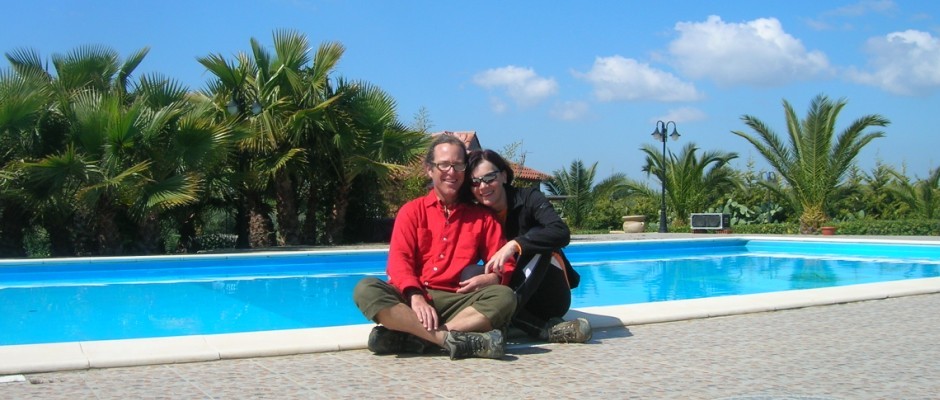On the day that Ferda and I rolled into Seoul, Saudi Arabia, without much fanfare, swung their doors open wide to tourism. It’ll be a flood, I’m sure. Doesn’t everyone want to go to Saudi Arabia??!! Googling for information in English about bicycle touring in the kingdom, I was only able to find accounts from Gürkan Genç and Pablo Garcia. I thought I’d give it a try.
I left Antalya in the afternoon, had a layover in İstanbul, and took the red eye to Jeddah. I slept at the most a couple hours on the flight (it was only 3.5 hours). I built my bicycle at the airport, got money from the ATM, and bought a SIM card. One thing I’ve learned from the first week of cycling here is that distances are huge. I left the airport around 3:30am, and it would have been getting light by the time I set up my tent so I decided just to pedal all the way in to the center of the city, about 37km from the airport.
I spent the first couple days exploring Jeddah’s historical center, Al Balad, one of Saudi Arabia’s few UNESCO World Heritage sites.
It’s street after street of buildings like these:
but I was surprised just how run down many of the buildings are.
Like my Dad asked, doesn’t Saudi Arabia have enough money to preserve one of their few historic areas?
There is a little restoration work going on:
and some buildings are perhaps new in the traditional style (or restored?).
As I was wandering around taking photos, I met Hasan from Cairo who took me out to a yummy Egyptian fish restaurant. He feels he’s been taken advantage of and hasn’t been paid in over a year. He’s filed a lawsuit, hoping to collect back pay of 157,000 SAR (US$~42,000). If problems like this are widespread, well, there aren’t many migrant workers who can afford to hang out in Saudi Arabia without getting paid for a year. Hasan wants to collect his money, get out, marry his girlfriend in Alexandria, and not return to Saudi Arabia.
Traditionally pilgrims started their haj from the Jeddah port and passed through the Mecca Gate, shown here:
I guess almost everyone goes by bus now.
Of course Jeddah’s not just old buildings, but I saw only a tiny part of this huge city (pop. ~4 million).
On my last evening in the city I rode to Middle Corniche Park where many families gather to chat, eat, and drink tea while admiring the world’s tallest fountain.
The following morning I pedaled another 35-40 km to get out of the sprawling industrial disaster that is southern Jeddah. I finally got my first view of the open sea:
The highlight of my first week in KSA was definitely the Al Qattan Tourism Village. It looks pleasant enough from the beach:
but the real deal is underwater:
I think it’s the best hard coral I’ve ever seen.
After Al Qattan I was excited to get to Mujairmah where I had heard there was good snorkeling. Well, it turns out Mujairmah is a grim, wind-blown place with frequent sand storms.
If it weren’t for the friendly, generous, helpful people that I met in Mujairmah, those 48 hours would have been much more miserable. Mohamed took me to lunch two days in a row.
Here I am with Mohamed and his colleagues at the local school:
I made it to a nearby shrimp farm that afternoon when I discovered I was missing my pump. Someone had moved my bike while I was inside the school and during the process knocked my pump off. Apparently (how is this possible?), they didn’t notice, and the guard found my pump later. Before figuring that out, the workers at the shrimp farm were exceptionally helpful. Khalid, the manager from Egypt, arranged a place for me to sleep for the night while Awadh and Ahmed, two young Yemenis from Madinat Al Mukalla, were a great help tracking down a new pump (which hopefully Awadh later returned — he had even insisted on paying for it!).
There are ~200 workers (one of who is Saudi) at the shrimp farm (there is a much larger farm with 3000 workers just south of this one), and there are two apartments for families. Currently one is vacant. To bring your family you must have a family visa. However, even if you have the family visa (like Dr. Inayathullah from Pondicherry who shared his room with me that night), you may choose to leave your family at home where schools (and life in general) are better. Ahmed, on the other hand, is from Yemen. He’s the only one with his family at the farm. Here he is:
I learned that consultants such as the aforementioned doctor spend three months working in Saudi Arabia followed by one month off. Most workers, however, are on a plan where they spend three months in their home country (where their wife and kids are) once every two years. What a life.
I must say that everyone who I asked was happy with their job at the shrimp farm.
I did manage a little snorkeling in Mujairmah. There were some fish, but almost all the coral was dead. I snorkeled from this beach:
Underwater looks like this:
Finally getting away from Mujairmah, the wind lessened a bit, the scenery improved a bit, and I continued to meet generous, curious people who gave me food and water.
I’ll end with some more Al Qattan snorkeling photos.


















































Wow! More adventures!